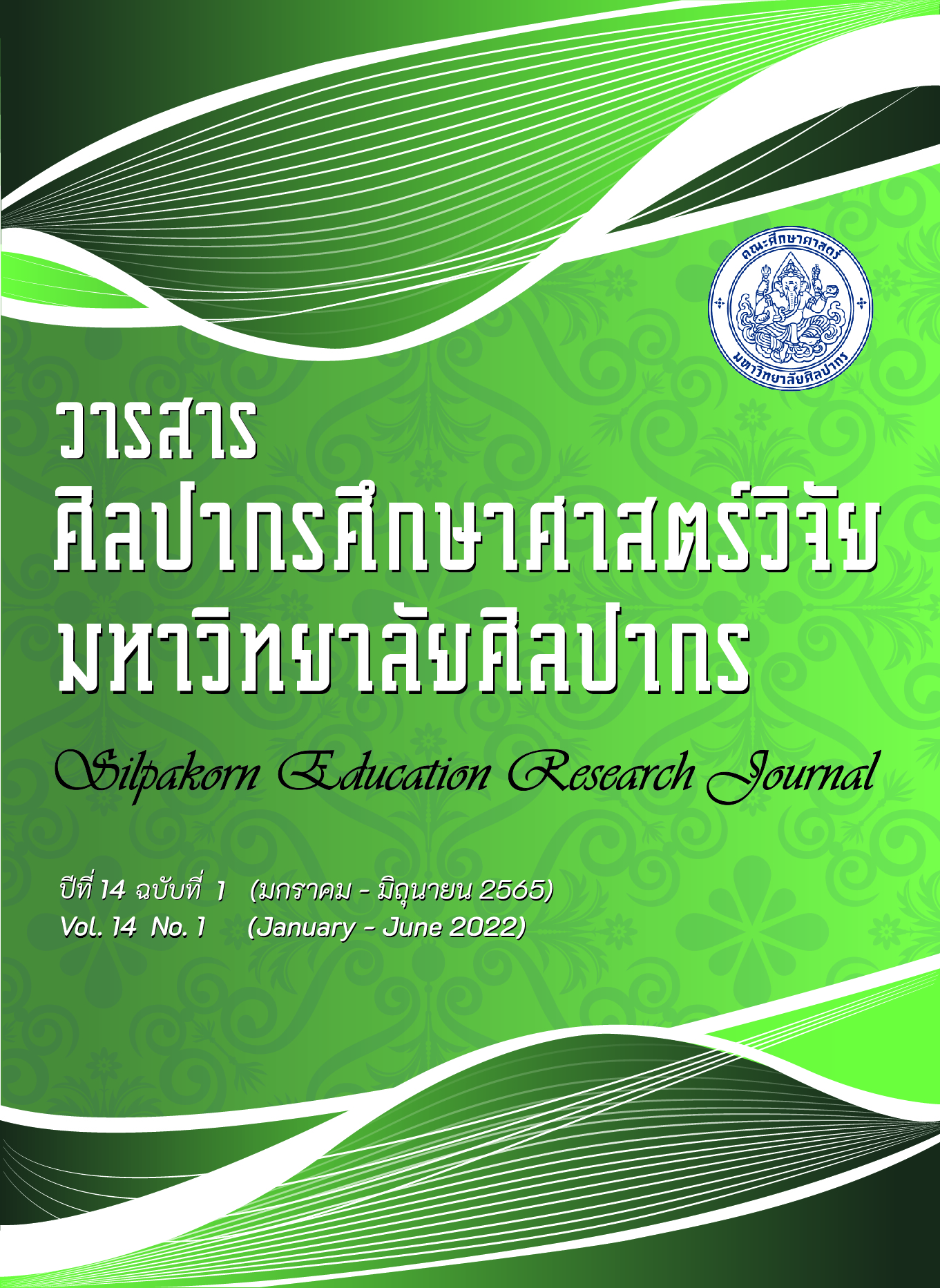การศึกษาความสัมพันธ์ระหว่างแรงจูงใจในการเรียนวิทยาศาสตร์ การรับรู้ความสามารถของตนเองด้านวิทยาศาสตร์ และการรู้เรื่องวิทยาศาสตร์ของนักเรียนชั้นมัธยมศึกษาตอนต้น
คำสำคัญ:
การรู้เรื่องวิทยาศาสตร์, แรงจูงใจในการเรียนวิทยาศาสตร์, การรับรู้ความสามารถของตนเองทางด้านวิทยาศาสตร์บทคัดย่อ
การวิจัยครั้งนี้ มีวัตถุประสงค์เพื่อ 1) ศึกษาการรู้เรื่องวิทยาศาสตร์ของนักเรียนชั้นมัธยมศึกษาตอนต้นที่มีชีวสังคมภูมิหลังแตกต่างกัน 2) ศึกษาความสัมพันธ์ระหว่างแรงจูงใจในการเรียนวิทยาศาสตร์ การรับรู้ความสามารถของตนเองด้านวิทยาศาสตร์และการรู้เรื่องวิทยาศาสตร์ 3) สร้างสมการทำนายการรู้เรื่องวิทยาศาสตร์ของนักเรียนชั้นมัธยมศึกษาตอนต้น กลุ่มตัวอย่างที่ใช้ในการวิจัย ได้แก่ นักเรียนชั้นมัธยมศึกษาปีที่ 3 สังกัดสำนักงานเขตพื้นที่การศึกษามัธยมศึกษา เขต 1 และ 2 กรุงเทพฯ จำนวน 410 คน โดยใช้การสุ่มอย่างง่าย ผลการวิจัย พบว่า 1) นักเรียนมีการรู้เรื่องวิทยาศาสตร์อยู่ในระดับค่อนข้างต่ำถึงต่ำ ทั้งในกลุ่มรวมและเมื่อจำแนกตามชีวสังคมภูมิหลัง 2) ความสัมพันธ์ระหว่างแรงจูงใจในการเรียนวิทยาศาสตร์ การรับรู้ความสามารถของตนเองทางวิทยาศาสตร์และการรู้เรื่องวิทยาศาสตร์ของนักเรียนชั้นมัธยมศึกษาตอนต้นที่มีลักษณะชีวสังคมภูมิหลังแตกต่างกัน ดังนี้ 2.1) แรงจูงใจในการเรียนวิทยาศาสตร์ มีความสัมพันธ์ทางบวกกับการรู้เรื่องวิทยาศาสตร์ของนักเรียนมัธยมศึกษาตอนต้นอย่างมีนัยสำคัญทางสถิติที่ระดับ.05 2.2) การรับรู้ความสามารถของตนเองด้านวิทยาศาสตร์มีความสัมพันธ์ทางบวกกับการรู้เรื่องวิทยาศาสตร์ของนักเรียนมัธยมศึกษาตอนต้นอย่างมีนัยสำคัญทางสถิติที่ระดับ.05 2.3) แรงจูงใจในการเรียนวิทยาศาสตร์ การรับรู้ความสามารถของตนเองด้านวิทยาศาสตร์มีความสัมพันธ์ทางบวกกับการรู้เรื่องวิทยาศาสตร์ของนักเรียนมัธยมศึกษาตอนต้นอย่างมีนัยสำคัญทางสถิติที่ระดับ.05 3) แรงจูงใจในการเรียนวิทยาศาสตร์ (X1) และการรับรู้ความสามารถของตนเองด้านวิทยาศาสตร์ (X2) สามารถทำนายการรู้เรื่องวิทยาศาสตร์ได้ร้อยละ 5.60 มีสมการทำนาย ดังนี้ Y = 3.634 + .316X1 + .211X2
เอกสารอ้างอิง
Bauinrind, D. (1996). Parenting Sryle. London: Oxford.
Bikkar, S.R., James, E.B. and Ingvar, L. (1993). Role of mathematics self-efficacy in the structural model of mathematics achievement. Journal of Educational Psychology 85(1): 41-43.
Chantraukrit, P. (2013). The development of teaching and learning models by integrating an argumentative inquiry model and model-based learning concepts to enhance science literacy and rationality of junior high school students. Doctoral of Thesis Curriculum and teaching disciplines. Chulalongkorn University. (in Thai)
Denonpho, S. (2011). Causal Factors Influencing Science Learning Achievement of Mathayomsuksa 3rd Students Under Educational Service Area Office Secondary Education District 30. Master of Education Thesis Research and Evaluation Program in Education Graduate Chaiyaphum Rajabhat University. (in Thai)
Department of Curriculum and Instruction Development. (2002). Research for the development of learning according to the basic education curriculum. Bangkok. (in Thai)
Fensham. P.J. (1986). Lessons from science education in Thailand: a case study of gender and learning in the physical sciences. Research in Science Education 16: 92-100.
Gonzales, P.N; & Gonzales, P. (2002). A structure equation model of parental involvement motivation aptitude Characteristics and academic achievement. The Journal of Experimental Education 70 (3): 257-287.
Hackett, G. (1985). The relationship of mathematics self-efficacy expectations to the selection of science-based college majors. Journal of Vocational Behavior 23(3): 329-345.
Huang, S.C. and Chang, S.F. (1996). Self-efficacy of English as a second language learner: An example of four learners. Dissertation Abstracts International.
Intun, S. (2009). Social causal factors and efficacy factors in stress management of Reading behavior in adolescent students. Master of Science Thesis research field Applied Behavioral Sciences Graduate School Srinakharinwirot University. (in Thai)
Jukaree, C. (2001). The effect of tutoring on predictive validity of the Academic Fundamentals Scale in selecting students to study in Prince of Songkla University. Master of Education Thesis Program Prince of Songkla University. (in Thai)
Klainin, S. Dejsri, P. and Pramojanee, A. (2007). Learning Quality Assessment Measures and Sample Exams from the International Student Assessment Program(PISA). Documents for Teacher Professional Development For science teachers. Institute for the Promotion of Teaching Science and Technology (IPST) published. (in Thai)
National Institute of Educational Testing Service Public Organization. (2018). Summary of the results of the Ordinary National Educational Test (O-NET). National Educational Testing Institute published. (in Thai)
Ngudgratoke, S. et al. (2018). Reforming data-driven science education to enhance the quality of science teaching at the secondary level. Nonthaburi: Sukhothai Thammathirat University. (in Thai)
OECD. (2013). PISA 2012 Results: What Makes Schools Successful? Resources, Policies and Practices (Volume IV). PISA. OECD Published.
OECD (2016). PISA 2015 Results (Volume II): Policies and Practices for Successful Schools. PISA. OECD Publishing. Paris.
OECD. (2019). Why don’t more girls choose to pursue a science career?. [Online)]. Retrieved March 18, 2019, from https://doi.org/10.1787/02bd2b68-en.
Office of the National Education Commission. (2017). National Education Plan 2017-2036. Bangkok: Prikwan Graphic. (in Thai)
Office of the National Education Commission. (1998). Summary of the 8th National Education Development Plan (1997-2001) Bangkok: The Teachers Council of Thailand, Ladprao Printing House. (in Thai)
Office of the Basic Education Commission. (2015). Knowledge of Science (OECD's PISA Test). Bureau of Academic Affairs and Educational Standards, Office of the Basic Education Commission Published.
Pintrich, P.R. and De-Groot, E.V. (1990). Motivation and self-regulated learning components of classroom academic performance. Journal of Educational Psychology 82(1): 33-40.
Rattanachan, R. (2004). The effect of self-control practice in science teaching on self-efficacy and science learning achievement of Mathayomsuksa 3rd students. Chulalongkorn University. (in Thai)
Ruengsirisate, S. (2009). Factors affecting Mathematical knowledge and abilities of ninth grade students in Bangkok metroporis. Bangkok: Chulalongkorn University. (in Thai)
Sangong, S. (1988). Causal relationship analysis of student components School and home environment with each component of scientific competence of primary school students in schools under Bangkok. Bangkok: Chulalongkorn University. (in Thai)
Sritrakul, P. (2020). The Factors Affecting of Programmed for International Student Assessment (PISA) in Thailand. Journal of Education and Social Development 15(2). (in Thai)
The Institute for the Promotion of Teaching Science and Technology. (2018). Summary of research results PISA2015. Institute for the Promotion of Teaching Science and Technology Published. (in Thai)
The Institute for the Promotion of Teaching Science and Technology. (2018). PISA 2015 Assessment Results Science, Reading and Mathematics Excellence and equality in education. Bangkok: Success Publication Company Limited. (in Thai)
Yokubon, N. (2012). Factors Affecting Science Learning Achievement of Prathomsuksa 6th Students at Demonstration Schools Under the Office of the Higher Education Commission Ministry of Education. Journal of Education and Social Development 8(1): 85-99. (in Thai)
Young, D.J., Reynold, A.J., & Wallberg, H.J. (1996). Science achievement and educational productivity: A hierarchical linear model. Journal of Educational Research 89(5): 272-278.





